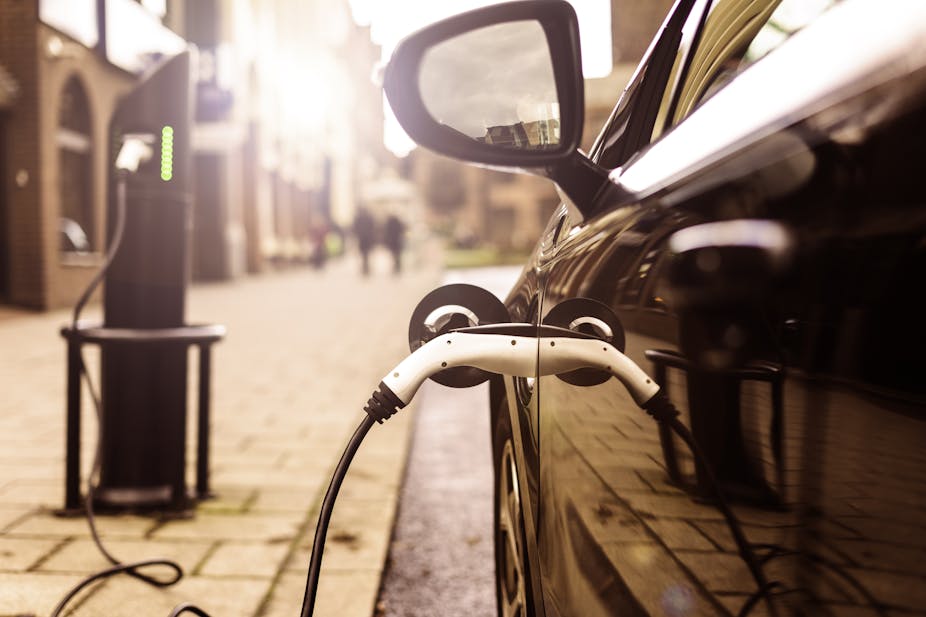The UK government is proposing a ban on the sale of new petrol and diesel vehicles by 2040, in a move that echoes a recent announcement in France.
Setting this sort of media-friendly target is a positive and welcome response to the challenge of air pollution across UK cities. But delivering the infrastructure, research and development support and incentives to switch to greener cars will be the hard part. If conventional vehicle manufactures start getting nervous, then environment secretary Michael Gove may find the road to an electric future needs to be paved with more than good intentions.
Planned well, a ban on sales of conventionally fuelled vehicles could deliver long-term benefits for both air quality and economic investment in post-Brexit UK. There is no question that a switch to alternative-fuelled vehicles would significantly improve air quality in towns and cities. The actual benefit will not be felt for many years, however, given the slow replacement rate for vehicles. Still, it does establish a clear direction of travel for public investment and as battery prices are set to tumble over the next decade, it will be one more reason for businesses to switch to greener vehicles.
The 2040 target should encourage big electric vehicle manufacturers to invest in the UK. The country is a significant consumer market and has strong production capabilities in green technologies, especially the use of lightweight materials. BMW, for instance, has just announced it will build the fully electric Mini at its plant in Oxford. An even clearer example of policy driving private investment is Chinese carmaker Geely’s investment in a new hybrid model of the London taxi to take advantage of the capital’s new “ultra low emission zone”.

Then there is the question of infrastructure. The UK has 6,535 charging stations, which sounds like a lot. But compare that to Norway, which has slightly more stations for a population less than a tenth the size. The number of charging points will have to rise to the hundreds of thousands.
A big ask
New homes are required to have charging points by 2019, but installation costs £1,000 in existing houses. Subsidies can reduce the cost, but will need to be taken up on a vastly greater scale. And even this won’t help those dependent on on-street parking or multi-story living. A comprehensive infrastructure would certainly cost hundreds of millions. And even if successful, the government faces another headache – lost fuel duty could leave a hole in the budget of between £9 billion and £23 billion by 2030.
Equally important is the need to think about energy supply. The widespread adoption of electric vehicles could put a strain on the grid at a time when fossil fuels are being phased out and a higher share of more volatile renewables is taking over. This means the government will need to think seriously about how excess power is stored during the hot, blustery days that favour solar or wind farms, and how to manage demand from electric vehicles when there is not enough sun or wind.
For car manufacturers, 2040 is several production cycles away. This gives them and the government time to think creatively about mass electrification. Roads that charge your car as you drive would need a big initial investment but would make electric cars significantly cheaper and better.
Self-driving cars and the trend towards mobility being a service you buy on demand through firms such as Uber might mean some people eventually don’t need to purchase vehicles at all. But these technologies are still many years away from the mainstream.
This highlights a key point: that a shift to sales of alternative fuelled vehicles will not immediately reduce air pollution and will do nothing to impact on congestion. Only a more comprehensive policy of shifting people to different modes of transport will achieve this, and here the government’s commitment shouldn’t be relied upon.
On an optimistic note, there are good reasons to imagine that a shift to greener vehicles may occur anyway. Pete Harrop, chairman of industry analysts IdTechEx, is bullish, predicting driving ranges of up to 1,000 miles and electric vehicles that can harvest solar electricity and act as batteries to store renewable power. “Electric vehicles are not simply catching up with conventional vehicles,” he told us. “They are overtaking.”
It’s clear which way the wind is blowing. Norway, as market leader, wants to ban sales of new petrol and diesel vehicles by 2025, and the German upper house has debated a 2030 target.
By 2040, internal combustion engines may no longer be able to compete in the market. But whether the UK’s infrastructure is ready for millions more electric vehicles remains to be seen.

